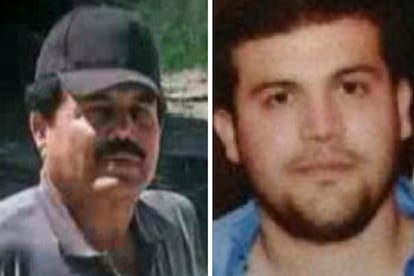‘El Mayo’ Zambada’s lawyer claims Sinaloa Cartel leader was ‘kidnapped’ by Joaquín Guzmán and handed over to US authorities
The drug trafficker’s defense claims that ‘El Chapo’ Guzmán’s son tied the drug lord up, threw him into a pick-up truck and forced him to board the plane that took him to El Paso, Texas, and jail

Ismael “El Mayo” Zambada was betrayed by one of the sons of his partner in crime, Joaquín “El Chapo” Guzmán. This is the version of events that the Sinaloa Cartel leader’s lawyer has propounded following the drug lord’s arrest last Thursday at a small airport in El Paso, Texas. Frank Perez told The Los Angeles Times that his client was “kidnapped by force” by Joaquín Guzmán López. “My client did not turn himself in or negotiate any deal with the U.S. government,” he insisted. On the morning of July 25, Zambada met with Guzmán López and — according to the lawyer’s account — was subdued by six men “dressed in military uniforms” and El Chapo’s son, who tied him hand and foot, threw him into the bed of a pickup truck and took him to a clandestine airstrip. “They forced him onto the plane, Joaquin tied his legs to the seat and brought him to the United States against his will. Only the pilot, Joaquín, and my client were on the plane,” Perez said.
Perez’s account reinforces the version that the drug trafficker never intended to turn himself in to U.S. authorities, who had been on his trail for more than 30 years and had placed a $15 million price on his head. A Beechcraft King Air landed Thursday afternoon at the airfield on the outskirts of El Paso, just a few miles from the Mexican border. When the plane landed, to the astonishment of DEA and FBI agents, the founder of the Sinaloa Cartel and Joaquín Guzmán López descended. The agents arrested the two men and efforts to bring them to justice began.
Zambada appeared in court in El Paso last Friday and heard the five counts the U.S. government has charged him with: trafficking fentanyl, cocaine and marijuana; money laundering; kidnapping; use of firearms, and conspiracy to commit murder. He pleaded not guilty. Transcripts of the hearing reveal that the 76-year-old kingpin appeared in court in a wheelchair, reinforcing information U.S. agencies had about his frail health. The legend of the great drug lord, beyond the reach of the authorities in the Sinaloa mountains, impossible to locate, and with a great ability to outwit any attempts to capture him, has evaporated.
Joaquín Guzmán López, 38, has only been identified by the U.S. Justice Department as a trafficker of cocaine, heroin and methamphetamines. El Chapo’s son has been transferred to the Chicago Metropolitan Prison — where his brother Ovidio has been held since last year, when he was extradited from Mexico — and is scheduled to appear before a judge Tuesday. In recent days, Ovidio Guzmán’s fate has become unclear: the Federal Prison System registry shows that “El Raton,” as he is also known, was released on Tuesday, July 23, two days before the arrest of El Mayo Zambada. Authorities in Mexico and the United States have insisted that Ovidio Guzmán is still under the protection of the justice system and that only the precautionary measures in place have been altered, without providing further details.
The possibility of Guzmán López benefiting from El Mayo Zambada’s detention will be played out in the U.S. courts that tried his father in 2019 and sentenced him to life in prison. The story unveiled by Zambada’s lawyer opens up new question marks about the status of the relationship between the Sinaloa Cartel and Los Chapitos — a faction led by El Chapo’s sons — and their father’s former partner. The Mexican government, meanwhile, has denied that it was involved in the operation to capture the drug lord. Mexican President Andrés Manuel López Obrador has claimed that he learned about Zambada’s arrest from the U.S. ambassador to Mexico, Ken Salazar, after it had taken place.
Sign up for our weekly newsletter to get more English-language news coverage from EL PAÍS USA Edition
Tu suscripción se está usando en otro dispositivo
¿Quieres añadir otro usuario a tu suscripción?
Si continúas leyendo en este dispositivo, no se podrá leer en el otro.
FlechaTu suscripción se está usando en otro dispositivo y solo puedes acceder a EL PAÍS desde un dispositivo a la vez.
Si quieres compartir tu cuenta, cambia tu suscripción a la modalidad Premium, así podrás añadir otro usuario. Cada uno accederá con su propia cuenta de email, lo que os permitirá personalizar vuestra experiencia en EL PAÍS.
¿Tienes una suscripción de empresa? Accede aquí para contratar más cuentas.
En el caso de no saber quién está usando tu cuenta, te recomendamos cambiar tu contraseña aquí.
Si decides continuar compartiendo tu cuenta, este mensaje se mostrará en tu dispositivo y en el de la otra persona que está usando tu cuenta de forma indefinida, afectando a tu experiencia de lectura. Puedes consultar aquí los términos y condiciones de la suscripción digital.









































